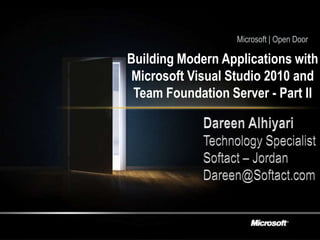VS TFS 2010 - Part2
- 1. Microsoft | Open DoorBuilding Modern Applications with Microsoft Visual Studio 2010 and Team Foundation Server - Part IIDareen AlhiyariTechnology SpecialistSoftact â JordanDareen@Softact.com
- 2. Agenda
- 3. Source Code Version Control
- 4. Source Code Version ControlChangesetsIntegrated Check-inCheck-in PoliciesWorkspacesShelvingKey Concepts
- 5. Source Code Version ControlLabelingCompare/DiffAnnotationBranching & MergingOther Concepts
- 6. Changesets
- 8. Check-in PoliciesRequirements for Check-inOverridableExtensible
- 9. WorkspacesClient side copy of source retrieved from repositoryOwned by one user on one machineChanges in workspace create pending changesWorkspace mapping = Repository folder mapped to local folder
- 10. ShelvingSwitch TasksPerform a Code ReviewBackup Work-In-ProgressCheckpoint Work-In-ProgressDeveloperShare Work-In-ProgressSet aside pending changes without checkinOptionally revert to unmodified filesRestore shelved changes by âunshelvingâUnshelve other userâs changesPower of task branching with less overheadScenarios
- 11. Version Control Integration with Other TFS ComponentsCreate various build scenarios
- 12. Build reports show associated changeset
- 13. Easily associate code to work items
- 14. Provides traceabilityVersion ControlInfluences version control structureAutomatically impacts velocity, code churn
- 15. Tracking Bugs, Tasks & Other Work ItemsWork Item Tracking Data StoreMain Functions:Add new or modify work itemsAttach files to work itemsCreate links among work itemsFind or list a filtered set of work itemsEach work item is assigned:A unique ID
- 16. Work item type
- 17. State
- 18. Assigned ToTest-Driven DevelopmentIntellectuals solve problems, geniuses prevent them- Albert Einstein
- 19. No Test
- 20. TDD
- 21. Testing
- 22. TDD
- 23. TDD
- 24. TDDHow to do itâĒ Design: figure out what you want to doâĒ Test: write a test to express the designâĒ It should FAILâĒ Implement: write the codeâĒ TestagainâĒ It should PASS
- 25. Time taken to fix bugs
- 26. Unit Testing
- 27. Automated UI TestingCoded UI testing enables you to automate user interface testing in Web and Windowsâbased applications. These regression tests ensure that subsequent changes to the code do not break sections that already work.
- 28. Static Code AnalysisJust because it compiles, doesnât mean it works!
- 31. IntilliTraceNo More âNo Reproâ BugsRich & Actionable BugsHistorical record of code execution.Like a DVR for debugging.Examine actual code execution.
- 32. IntilliTrace
- 33. Building CodeEnd to End IterationBuild TargetsBuild BreakBuild Error
- 34. Building CodeCommonly used targets
- 35. DemoI'm a great believer in luck, and I find the harder I work the more I have of it.- Thomas Jefferson
- 36. SummaryTeam Foundation Server (TFS) is the collaboration platform at the core of Microsoft's application lifecycle management solution. TFS automates and streamlines the software delivery process, as well as provides full traceability and realâtime visibility into project status, for all team members, with powerful reporting tools and dashboards.
- 37. Thank You!Quality is never an accident; it is always the result of high intention, sincere effort, intelligent direction and skillful execution; it represents the wise choice of many alternatives.- William A. Foster
- 38. ÂĐ 2010 Microsoft Corporation. All rights reserved. Microsoft, Windows, Windows Vista and other product names are or may be registered trademarks and/or trademarks in the U.S. and/or other countries.The information herein is for informational purposes only and represents the current view of Microsoft Corporation as of the date of this presentation. Because Microsoft must respond to changing market conditions, it should not be interpreted to be a commitment on the part of Microsoft, and Microsoft cannot guarantee the accuracy of any information provided after the date of this presentation. MICROSOFT MAKES NO WARRANTIES, EXPRESS, IMPLIED OR STATUTORY, AS TO THE INFORMATION IN THIS PRESENTATION.
- 39. QuestionsThank You!Contact InfoDareenAlhiyariTechnology SpecialistDareen@softact.com
Editor's Notes
- Add timeline, geek image, tik tac toe imageAdd crossroads image, quote: âfind a job you love, and youâll never work a day in your lifeâ


































